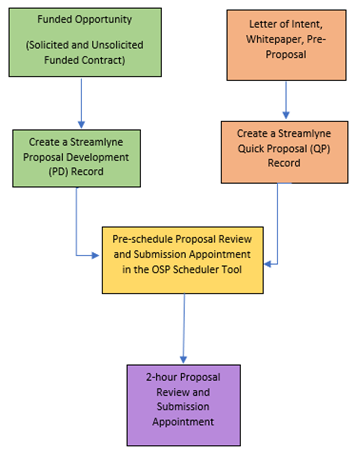Defining the Opportunity and OSP Process
All projects submitted to OSP for review start with the following steps:
Step 1. The department creates a Streamlyne record. A corresponding Streamlyne record number is generated and will need to be used as the reference for communication and scheduling with OSP. More information on creating a Streamlyne account can be found on the OVPR website, by clicking here.
*Note: Streamlyne (PD) Proposal Development records will be required for all funded opportunities that include:
- Solicited Proposals
- New Proposal Request
- Competitive Renewals
- Re-Submissions
- Task Orders Under a Master Agreement
- Unsolicited Funded Contracts
Steamilye (QP) Quick Proposal record will be required for:
- Letters Of Intent
- Whitepaper
- Pre-Proposals
Step 2. The Streamlyne record should serve as the official reference number for all documents and correspondences related to the given action. The following documents must be uploaded: scope of work, budget worksheet, budget justification, other sponsor specified or UNM required forms as applicable, and either a solicitation or the contract for Unsolicited Funded Contracts.
Step 3. To schedule a Proposal Review appointment, click here.

To ensure consistency in how these opportunities are defined, the following are definitions, characteristics, and specific processing that should be noted for these two types:
- Solicited Proposals: requests from sponsors for submission of a proposal according to the requirements outlined in the sponsor-issued solicitation.
- A proposal is being developed in response to public funding announcements, solicitations, or formal requests for proposal.
- Typically, the sponsor clearly states the expectations of the proposal offeror in the solicitation. It may also include a deadline for proposals and other specific requirements that must be met.
- Depending on the sponsor, a proposal consists of a statement of work, a budget, a written budget narrative, and a letter of commitment endorsed by an Authorized Organizational Representative (OSP Proposal Specialists hold this delegated authority).
- Task Orders are usually issued as a request from a sponsor with whom the University has a current Master Agreement. Task Orders are normally received via email and contain the reference number of a current Master Agreement.
- Unsolicited Funded Contracts: non-competitive prospects that might result from a sponsor engaging a PI or vice versa for completion of a specific scope of work, but where no formal solicitation has been published for the request of proposals.
- An opportunity that is made available to the University without a formal solicitation from a sponsor which may result in a new award via a contract or cooperative agreement.
- If a contract or cooperative agreement is being discussed and there was no solicitation issued for the opportunity, the instrument serves as the indication of an unsolicited opportunity but must not be negotiated or signed by the PI or department.
Records for Unsolicited Funded Contracts that do not have a solicitation will still be required to include a scope of work, budget and budget justification, and other sponsor requirements, or UNM required forms as applicable for internal processing.
